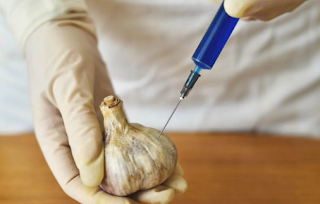The Power of Allicin: Unraveling the Antimicrobial Properties of Garlic"
Garlic, known scientifically as Allium sativum, has been used for centuries for its various health benefits. One of the key compounds responsible for its potent antimicrobial properties is allicin. Allicin is a sulfur-containing compound that is formed when garlic is crushed or chopped, and it is responsible for the pungent smell and taste of garlic. In this article, we will unravel the antimicrobial properties of allicin and explore its potential health benefits.
Antimicrobial Properties of Allicin
Allicin has been shown to exhibit a broad spectrum of antimicrobial activity, which means it can effectively inhibit the growth of various microorganisms, including bacteria, fungi, viruses, and parasites. Studies have shown that allicin can inhibit the growth of many common pathogens, including Escherichia coli (E. coli), Staphylococcus aureus (S. aureus), Candida albicans (C. albicans), and Helicobacter pylori (H. pylori), among others.
One of the key mechanisms by which allicin exerts its antimicrobial activity is through its ability to disrupt the cell membrane of microorganisms. Allicin can penetrate the cell membrane and disrupt its integrity, leading to leakage of cellular contents and ultimately cell death. Additionally, allicin has been shown to inhibit the activity of various enzymes that are necessary for the survival and replication of microorganisms, further contributing to its antimicrobial effects.
Health Benefits of Allicin
The antimicrobial properties of allicin may offer a wide range of health benefits. Here are some potential areas where allicin may exert its positive effects:
- Immune Support: Allicin has been shown to have immune-modulating properties, meaning it can help regulate the immune system. By supporting a healthy immune response, allicin may help the body defend against infections caused by microorganisms.
- Cardiovascular Health: Allicin has been shown to have potential benefits for cardiovascular health. Studies have suggested that allicin may help reduce cholesterol levels, lower blood pressure, and improve blood flow, which may contribute to a healthy cardiovascular system.
- Antioxidant Activity: Allicin has been shown to possess antioxidant activity, meaning it can help neutralize harmful free radicals in the body. Free radicals are highly reactive molecules that can damage cells and contribute to various diseases, including cancer and aging.
- Anti-inflammatory Effects: Allicin has been shown to exhibit anti-inflammatory effects, which may help reduce inflammation in the body. Chronic inflammation has been linked to various diseases, including cardiovascular disease, diabetes, and cancer, so reducing inflammation may have a positive impact on overall health.
- Antifungal and Antiviral Activity: Allicin has been shown to have antifungal and antiviral activity, which may help inhibit the growth of fungi and viruses. This may be particularly beneficial in the treatment and prevention of fungal infections and viral illnesses.
Incorporating Garlic into Your Diet
To fully harness the potential antimicrobial properties of allicin, it's important to consume garlic in its raw or crushed form, as allicin is produced when garlic is chopped or crushed. However, allicin is relatively unstable and can degrade quickly when exposed to heat, light, and air. Therefore, to maximize the allicin content of garlic, it's best to consume it raw or crushed and let it sit for a few minutes before cooking to allow the allicin to fully develop.
Garlic can be easily incorporated into your diet in various ways, such as adding it to sauces, dressings, marinades, soups, or stir-fries. You can also take garlic supplements in the form of capsules or tablets, but it's important to choose a reputable brand and follow the recommended dosage instructions.
It's worth noting that while allicin has many potential health benefits, consuming garlic alone is not a magic cure-all. A balanced diet, regular exercise, adequate sleep, and a healthy lifestyle overall are crucial for maintaining optimal health.
Conclusion
Garlic, and specifically its active compound allicin, has been recognized for its potent antimicrobial properties and potential health benefits. From immune support to cardiovascular health, antioxidant activity to anti-inflammatory effects, and antifungal/antiviral activity, allicin in garlic may offer a wide range of health benefits. Incorporating raw or crushed garlic into your diet can be a flavorful and nutritious way to enjoy the potential benefits of allicin. As always, it's important to consult with your healthcare provider before making any significant changes to your diet or starting any new supplements to ensure they are safe and appropriate for your individual health needs.

.png)

.png)
Post a Comment for "The Power of Allicin: Unraveling the Antimicrobial Properties of Garlic""